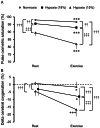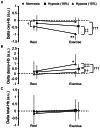The effects of exercise under hypoxia on cognitive function
- PMID: 23675496
- PMCID: PMC3651238
- DOI: 10.1371/journal.pone.0063630
The effects of exercise under hypoxia on cognitive function
Abstract
Increasing evidence suggests that cognitive function improves during a single bout of moderate exercise. In contrast, exercise under hypoxia may compromise the availability of oxygen. Given that brain function and tissue integrity are dependent on a continuous and sufficient oxygen supply, exercise under hypoxia may impair cognitive function. However, it remains unclear how exercise under hypoxia affects cognitive function. The purpose of this study was to examine the effects of exercise under different levels of hypoxia on cognitive function. Twelve participants performed a cognitive task at rest and during exercise at various fractions of inspired oxygen (FIO2: 0.209, 0.18, and 0.15). Exercise intensity corresponded to 60% of peak oxygen uptake under normoxia. The participants performed a Go/No-Go task requiring executive control. Cognitive function was evaluated using the speed of response (reaction time) and response accuracy. We monitored pulse oximetric saturation (SpO2) and cerebral oxygenation to assess oxygen availability. SpO2 and cerebral oxygenation progressively decreased during exercise as the FIO2 level decreased. Nevertheless, the reaction time in the Go-trial significantly decreased during moderate exercise. Hypoxia did not affect reaction time. Neither exercise nor difference in FIO2 level affected response accuracy. An additional experiment indicated that cognitive function was not altered without exercise. These results suggest that the improvement in cognitive function is attributable to exercise, and that hypoxia has no effects on cognitive function at least under the present experimental condition. Exercise-cognition interaction should be further investigated under various environmental and exercise conditions.
Conflict of interest statement
Figures




References
-
- Brisswalter J, Collardeau M, Arcelin R (2002) Effects of acute physical exercise characteristics on cognitive performance. Sports Med 32: 555–566. - PubMed
-
- McMorris T, Sproule J, Turner A, Hale BJ (2011) Acute, intermediate intensity exercise, and speed and accuracy in working memory tasks: a meta-analytical comparison of effects. Physiol Behav 102: 421–428. - PubMed
-
- Dietrich M, Audiffren M (2011) The reticular-activating hypofrontality (RAH) model of acute exercise. Neurosci Biobehav Rev 35: 1305–1325. - PubMed
-
- Wilmore JH, Costill DL, Kenney WL (2008) Physiology of Sport and Exercise. 4th ed. Champaign: Human Kinetics. 292–293.
-
- Amann M, Kayser B (2009) Nervous system function during exercise in hypoxia. High Alt Med Biol 10: 149–164. - PubMed
MeSH terms
Substances
LinkOut - more resources
Full Text Sources
Other Literature Sources
Medical

